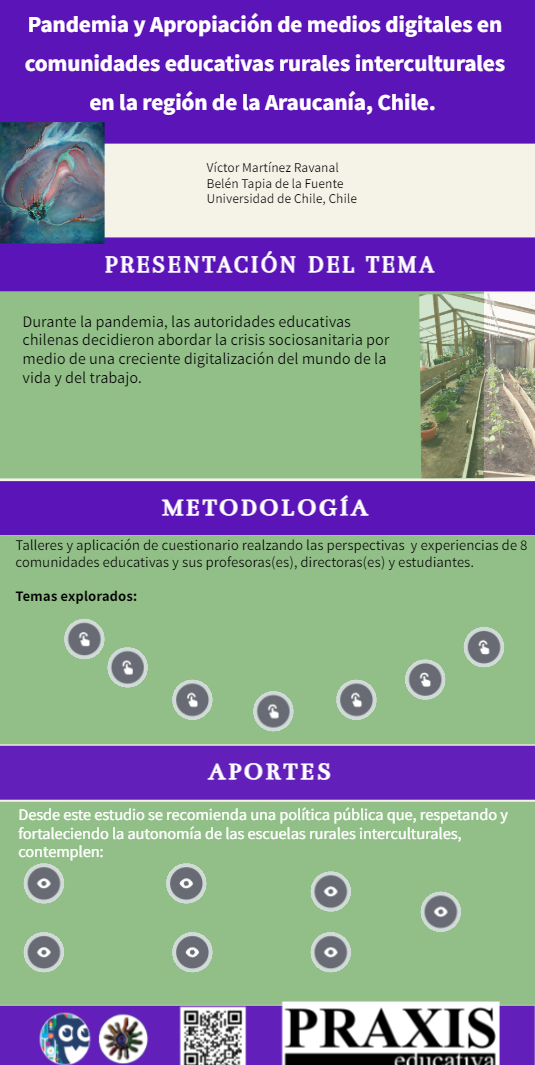Model of appropriation and use of audiovisual/digital media in rural intercultural educational communities in the Araucanía region, Chile.
DOI:
https://doi.org/10.19137/praxiseducativa-2023-270219Keywords:
digitization, school, school-community relationship, pandemic, rural environmentAbstract
The purpose of this study was to develop a model of appropriation and use of audiovisual/digital media in rural intercultural schools applying a modeling methodology with a naturalistic approach. Teachers, directors and students from eight schools in the Araucanía region participated. In addition, a questionnaire was applied to forty-nine teachers from intercultural rural schools in the region. The elaborated model establishes that the process of changes that Chilean society is experiencing, consisting of a growing and accelerated digitization of the world of life and work, configures a complex context in which teachers deploy their educational praxis and that is conditioning the Appropriation and Use that they make of audiovisual/digital media, both in their institutional work and in their daily lives. Among other aspects, the appropriation and use of these media is expressed in the active role of the teachers in the production of their own audiovisual material, orienting it mainly to the empowerment of Being Mapuche.
Downloads
References
Alarcón-Cháires, P (2017) Epistemologías Otras: Conocimientos y saberes locales desde el pensamiento
complejo. Tsíntani, AC. IIES, UNAM. México.
Crenshaw, K. (1989) "Oemarginalizing the lntersection of Race and Sex: A Black Feminist Critique of
Antidiscrimination Doctrine, Feminist Theory and Antiracist Politics," University of Chicago. Legal Forum:
Vo/-1, NºS.
Cobbo, R. (200S) El género en las ciencias sociales. Cuadernos de Trabajo Social, 18, 249-258.
Cruz, E. (2013) Multiculturalismo e interculturalismo: una lectura comparada Cuadernos lnterculturales, vol. 11,
núm. 20, pp. 45-76 Universidad de Playa Ancha Viña del Mar, Chile.
Gorosito, M. (noviembre de 2022) Rol docente y la transmisión de los estereotipos de género: la histórica
feminización de la función educativa y su impacto en la actualidad. Panel Psicología Educacional. XIV
Congreso Internacional de Investigación y Práctica Profesional en Psicología, Universidad de Buenos Aíres.
Hooks, B. (2021) Enseñar a transgredir: La educación como práctica de la libertad. Ed. Capitan Swing.
Laval, C. y Dardot, P. (2015) Común. Ensayo sobre la revolución en el siglo XXI. Barcelona: Gedisa.
Libaneo,j. (2000) Adeus professor, adeus professora? Novas exigencias educacionais e profissao docente. 4ª
ed.
Loncón, E.; Quilaqueo, D.; Quintriqueo, S. y Riquelme, E. (2016). Educación mapuche y educación escolar en la
Araucanía, ¿doble racionalidad educativa1 Cadernos de Pesquisa 46(162) 1050-1070
Martínez, V. (2022) Comunidad Educativa. Ensayo sobre la comunidad en la escuela y la escuela en la
comunidad. Magíster en Educación Mención Currículo y Comunidad Educativa. Documento pedagógico.
Universidad de Chile.
Mejía, L. (2021) Ciberviolencia contra la mujer y covid-19: desafíos inmediatos y situación en América Latina.
Investigación joven con perspectiva de género VI. Instituto de Estudios de Género, Universidad Carlos 111 de
Madrid.
Minakata, A. (2009) Gestión del conocimiento en educación y transformación de la escuela Notas para un
campo en construcción. Sínéctíca, (32), 17-19
McKernan, J. (1999). Investigación-acción y currículum. Madrid: Morata.
MINEDUC (2016). Orientaciones para la construcción de comunidades educativas inclusivas.
https://bibl iotecad igital.m i ned uc.cl/hand le/20.500.12365/ 491
Pinto, R. (2020). Currículum y descolonización: la construcción de un currículum crítico emergente en una
escuela básica comunitaria Mapuche Lafquenche, LLaguepulli, región de la Araucanía (Chile), Revista
Enfoques Educacionales, vol. 17 No. 2:39-58.
Poblete, M. (2003) Discriminacion étnica en relatos de la experiencia escolar mapuche en Panguipulli
(Chile) Estudios pedagógicos (Valdivía), (29), 55-64. Https://dx.doi.org/10.4067 /s0718-07052003000100004
Restrepo, B. (2004) La investigación-acción educativa y la construcción de saber pedagógico. Educación y
Educadores, núm. 7, 2004, pp. 45-55 Universidad de La Sabana Cundinamarca, Colombia
Rivera, R. (2002) Discusiones acerca de la investigación naturalista en educación: Apuntes sobre
Costa Rica. Horizonte de la Ciencia 12 (22) ene-jun 2022 FE/UNCP ISSN
Zubiri, X. (1995) Estructura dinámica de la realidad. Alianza Editorial. Fundación Xavier Zubiri. Madrid.
España.

Published
Issue
Section
License
Copyright Notice
Editorial Committee Educational Praxis Magazine:
I hereby declare that I am the author of the article titled (article name), that it is original and my own and that it was not previously published in any other format or medium. I declare to know that the magazine will not charge me any type of fee under any circumstances, nor will I receive any type of monetary compensation If it were accepted for publication in Educational Praxis, I authorize the aforementioned magazine to publish it digitally and to advertise it on its social networks.
If the work is published, I adhere to the Creative Commons license called "Attribution - Non-Commercial Share Alike CC BY-NC-SA", through which it is allowed to copy, reproduce, distribute, publicly communicate the work and generate derivative works, as long as when the original author is cited and acknowledged. This license has been used since September 2018. In 2016 CC BY NC ND 4.0 was adhered to; and in the years 2017 and 2018 (January-August) CC BY NC 4.0.
This CC BY-NC-SA Share Alike license does not, however, permit commercial use of the work. As an author, the journal may establish additional agreements for the non-exclusive distribution of the version of the work published in the journal, it allows me to self-archive the published articles, in their post-print version, in institutional, thematic repositories, personal web pages or any other relevant use. with the recognition of having been first published in this journal.
Educational Praxis adheres to DORA (Declaration on Research Assessment) signed in San Francisco, California, on December 16, 2012, and to the Declaration of Mexico (Joint Declaration LATINDEX - REDALYC - CLACSO - IBICT).














_(1)2.png)


3.png)











_(2).png)






2.jpg)









